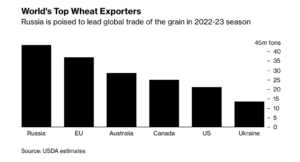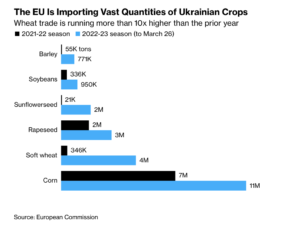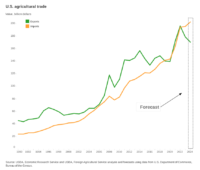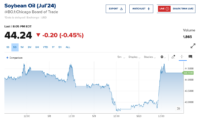Bloomberg's Clarice Couto reported this past Friday that "a surprising tax change in agriculture powerhouse Brazil has the potential to make soy grown in the world’s largest bean exporter less…
Canadian Farmers Expect More Wheat Acres This Year, “The Most in 22 Years”
Dow Jones writer Robb M. Stewart reported yesterday that, “Canadian farmers expect to plant more wheat this year, and increase crops of canola and soybeans.
“Nationally, farmers forecast planting 26.97 million acres of wheat in 2023, up 6.2% from the year before but below the 8.2% annual increase recorded last year, Statistics Canada said Wednesday.
“The spring wheat area is expected to increase 7.5% to 19.39 million acres, durum wheat is expected to edge up 0.9% to 6.06 million acres, while the winter wheat area is anticipated to be boosted 12.7% to 1.52 million acres, the data agency said.”

Reuters writer Rod Nickel reported yesterday that, “Canadian farmers intend to plant the most wheat in 22 years, a government report said on Wednesday, as the war in Ukraine and drought in the United States tighten global supplies.
“Global stocks of wheat and vegetable oil have been limited by obstacles facing Ukraine’s exports, and Russia has signaled it may not allow a deal securing a safe Black Sea grain corridor to extend beyond May 18.
Winter wheat ratings in the United States, the world’s fifth-largest exporter, are the lowest since 1989 due to drought.
Also yesterday, Reuters writers Gus Trompiz and Luiza Ilie reported that, “Romania, one of the European Union’s biggest grain producers, is expected to harvest 10.35 million tonnes of wheat this year in a sharp rebound from last year as farm belts recover from drought, consultancy Agritel said on Wednesday.”
The article noted that, “Other observers also anticipate improved wheat yields this year in Romania and other parts of eastern Europe, which could maintain large supplies that some EU nations have blamed on an influx of cheaper crops from war-torn Ukraine.”

“‘We will have a good crop, Ukraine will have a good crop because they too got rain. It is not going to be good, because the two crops will clash again,’ Cezar Gheorghe of consultancy AGRIColumn told Reuters.
“In response to pressure from farmers and governments, the EU is proposing to temporarily restrict Ukrainian grain to transit in five eastern EU countries, including Romania, while offering aid for local farmers.”
A separate Reuters article from yesterday reported that, “The European Union’s agriculture chief expressed optimism on Tuesday that countries neighbouring Ukraine will shortly accept a deal to allow Ukrainian grain to enter their countries for export elsewhere.”
Meanwhile, Reuters News reported today that, “Only its full implementation can save the Black Sea grain deal from collapse, Russia’s foreign ministry said on Thursday, reaffirming Moscow’s dissatisfaction with an accord that aims to prevent a global food crisis.”
The article indicated that, “‘(The deal) is not a buffet you can pick and choose from,’ Russian foreign ministry spokeswoman Maria Zakharova told a regular news conference in Moscow, adding that implementation of the deal so far had been unsatisfactory.
“Russia and Ukraine are major grain producers, but Moscow says parts of the deal that are meant to allow it to export its own agricultural goods via the Black Sea are not being honoured.
“Although Russia’s agricultural exports have not been explicitly targeted by Western sanctions, Moscow says restrictions on its payments, logistics and insurance industries – imposed over its military actions in Ukraine – have created a barrier to the export of its grains and fertilisers.”
Dow Jones writer Kirk Maltais reported yesterday that, “The Black Sea Grain Initiative came under stress again today, making the movement of grain futures volatile. In the Black Sea, the impending expiration of the current deal is magnifying Russian rhetoric.”
And Reuters writer Naveen Thukral reported today that, “Chicago wheat futures fell for a seventh consecutive session on Thursday, hitting a 21-month low, as forecasts of rains in the U.S. grain belt and plentiful of global supplies weighed on prices.”







